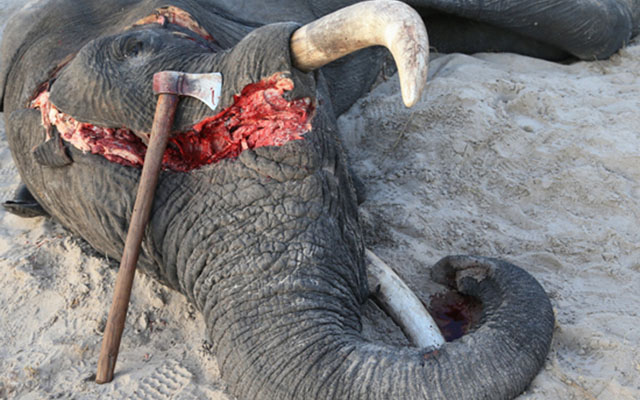China must not ban ivory trade


Ban on ivory trade has continued to lead to an increase in demand for ivory, resulting in increase in elephant poaching and illegal ivory trade
Emmanuel Koro Correspondent
The former Secretary-General of the UN Convention on International Trade in Endangered Species of Fauna and Flora (CITES) has warned China not to give in to animal rights groups’ pressure to make it completely stop ivory trade because it would result in untold elephant poaching in the near future, for which China itself would ironically be blamed.
China is the world’s biggest ivory trade market, followed by the United States of America.
Despite knowing that the ban in ivory trade increases the demand for ivory trade on the illegal market and also increases elephant poaching, animal rights groups have continued to support ivory trade ban since 1989.
On the contrary, scientific authorities including the IUCN-World Conservation Union Elephant Specialist Group continue to say that the ivory trade ban has not helped to stop poaching. In response, African elephant range states have then argued that why not introduce a new elephant conservation paradigm shift in which legal and controlled trade in ivory can then be used to flood the market and in turn replace the illegal ivory trade and also end elephant poaching.
“We know that China is now under great pressure to somehow stop all ivory demand and to participate in the prohibition of all ivory trade,” said the CITES former Secretary, Mr Eugene La Pointe who is now the President of the IWMC — The World Conservation Trust, in an appeal letter written to Chinese Government asking it not to stop ivory trade as this would harm elephant conservation in Africa.
“This pressure comes from animal rights groups, western celebrities, politicians, journalists and even from those who administer CITES itself. If China were to succumb to these pressures, the result would be disastrous for Africa’s elephants.”
Mr La Pointe said that “it is important to understand that African elephants are not in imminent danger of going extinct”.
However, he said that tens of thousands of elephants have been poached over long periods, particularly so in war-torn areas and in western Africa. At the same time, other stocks have prospered to the point where managed culling is necessary to protect the natural biodiversity from damage caused by an unsustainable elephant population.
Degraded woodlands resulting from large elephant populations have undermined the survivability of many other animal species.
The Switzerland-based IWMC-World Conservation Trust headed by Mr Lapointed shares the common view that African elephants are magnificent animals whose populations should thrive. However, Mr La Pointe said that for this to happen in the future, conservation measures should be based on facts and economic realities rather than sentiment and politics.
Sustainable conservation, encompassing the carefully-managed use of wildlife, controlled trade and derived benefits for local people, facilitates the best outcome for most wildlife resources.
Over the past 30 years, it has been fashionable among Westerners to promote efforts to “save” the African elephant. As one of the primary users of ivory, China has unfortunately been targeted by westerners who argue that elephants will be only “saved” once demand for ivory and all trade have been eliminated.
“When CITES (the Convention on Trade in Endangered Species) adopted a moratorium on trade in ivory at COP14 in The Hague (2007), we warned that it amounted to a “Poachers Charter”, said Mr Lapointe. “We were right. I said this is a complete disaster for elephants.
“Illegal traders now have at least nine years when they can monopolise the ivory market. This is nothing short of a Poachers’ Charter and it means that elephants will be killed indiscriminately.”
There are no known examples in human history where efforts to eliminate demand for a product have succeeded. Perhaps the most well-known failure in this regard was the prohibition of alcohol in America in the 1930s.
“The simple fact is that demand for ivory will continue to exist either as a legal product or in a black market,” said Mr Lapointe. “The evidence today is clear that the latter produces the devastation of indiscriminate poaching and widespread corruption while the former, as is seen in southern Africa, produces abundant elephant populations. Since demand for ivory will never disappear, it surely is clear that we should learn to work within the ivory market and to control it.”
Pro-ivory trade African elephant range states, together with NGOs worldwide that support the need for ivory trade to stop elephant poaching continue to argue that the ban in ivory trade does not stop poaching, but ironically increases it.
They present an argument that is backed by the laws of economics that when you ban a commodity, this automatically increases its demand. Therefore, the ban on ivory trade has continued to lead to an increase in demand for ivory, resulting in increase in elephant poaching and illegal ivory trade.
One of the biggest animal rights groups the Humane Society of the United States (HSUS) interestingly admits the reality that the ivory trade ban that they together with other animal rights groups have continued to sponsor within the CITES decision making framework; is not helping to stop poaching. Ironically, it is helping to increase elephant poaching and in illegal trade in ivory.
“Global demand for ivory products is fuelling the elephant poaching crisis despite the international ban on commercial trade in ivory that was established in 1990,” said the HSUS, in statement published on its website. “China is the largest market for ivory products, followed by the United States.”
Despite admitting that ivory trade ban is not working, animal rights groups such as the HSUS still continue to senselessly support the ivory trade ban without opting for a new paradigm shift of introducing legal and controlled ivory trade as a means to decrease demand for ivory and in turn reduce elephant poaching. Over the past 30 years, upon discovering the failure of ivory trade ban to stop elephant poaching and illegal ivory trade — the African elephant ranges and pro-ivory NGOs such as the IWMC have continued to call for legal and controlled ivory trade as a solution to stop poaching.
“Logic tells us that it does not follow that laws prohibiting trade in ivory will prevent all elephants from being killed,” said Mr La Pointe of the IWMC. “This is why the animal rights groups today choose to promote the mistaken notion that legal trade feeds illegal trade and why they rationalise that there is no difference between these two completely different activities.”
“Those lobbying to ban all trade in ivory have failed to produce any hard statistics to support this claim,” said Mr Lapointe. “It therefore would be more accurate to regard it simply as a smear. They have, however, scored a big public relations success by conflating legal and illegal trade in the western media and beyond.
Unfortunately, it seems that it is far easier to persuade British royalty or Hollywood stars to adopt an irrational mantra than it is to actually deter elephant poaching.”
He said that both the language and the actions of the animal rightists’ are flawed.
“As I stated in 2007, the beneficiaries of a complete ban on all legal ivory trade are the poachers, criminal gangs and corrupt officials who drive the illegal trade — and who the campaigners suppose they are opposing,” said Mr Lapointe. “Of course, the animal rights groups themselves raise billions of dollars through their campaigns in the United States and Europe, so a ban also satisfies their financial needs”.
Long frustrated with animal rights’s unjustified support for ivory trade ban over the past 32 years, — African elephant ranges states, together with NGOs that support ivory trade; in order to save the elephants are now convinced that animal rights groups selfishly desire to profit from creating an elephant poaching and illegal ivory trade crisis through there deliberate and continued ban in ivory trade. The bigger the elephant poaching crisis the more money they would make in the future.
“When a ban on all ivory trade results in the black market expanding and becoming even more difficult to curtail — as it inevitably will — we believe that China will receive the primary blame,” warned Mr Lapointe in a letter to senior Chinese Government, including the Chinese Premier LI Keqiang. “China can therefore expect the same Westerners and regulators who are today praising moves against the ivory trade to be once again leading a chorus of international disapproval against China. They will argue that elephants are dying because China has failed to properly enforce the ban.
Mr Lapointe said that this projected elephant poaching crisis erupts because of the ivory trade ban sponsored by the animal rights groups, the righteous animal rights lobby would never blame itself for the systematic elephant slaughter.
“It is our hope that China will maintain its leadership role on international wildlife issues at a height of non-traditional security and cultural self-confidence so as not to be unduly influenced by the dangerous and false populism propagated by the Western animal rights lobby,” Mr Lapointe. “We stand ready to pursue our close cooperation with China for the sustainable conservation of all wildlife.”
For many years, African elephant range states have argued that the animal rights groups’ continued sponsorship of ivory trade ban have made them suffer persecution and dispossession, including untold poverty as they cannot earn income from their own ivory.
The African range states and pro-ivory trade NGOs say that It is through the animal rights groups continued and unjustified intervention on how Africans should manage and use their elephants products, why there is no democracy in the management of African range states’ elephants and trade in their products such as ivory.
The African people wonder why they continue to suffer under Western imposed elephant management agenda and yet Africa has never told the Westerners or anyone in the world on how to trade and use in their products, including oil that is very harmful to wildlife and the environment.
Emmanuel Koro is a Johannesburg-based international award-winning environmental journalist.










Comments